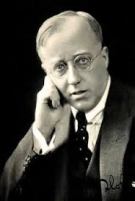Ralph Vaughan Williams was born in Down Ampney in Gloucestershire, but although he was deeply involved in the folk-song revival, for most of his adult life he lived in London and saw himself as a city man.
Ralph’s father was a vicar, son of an eminent lawyer, and his mother was niece of Charles Darwin, and great-granddaughter of Josiah Wedgwood. Wealthy and cultured, they sent Ralph to Charterhouse, from whence he continued to Trinity College Cambridge via the Royal College of Music. Composing did not come easily to him, so he returned to the RCM to study with Parry, Wood and Stanford, and then went on to study with Max Bruch in Berlin and Maurice Ravel in Paris. It was while he was studying with Ravel that he began composing the first of the Five Mystical Songs.
His slow-burn development delayed his arrival as the leading British composer of his generation. He was consciously an English composer with strong roots in English folk music. He was at pains never to be elitist, an ideal he shared with his friend Gustav Holst. Since the two composers shared so much, they had what they referred to as ‘field days’, which they put aside to criticise one another’s work. Vaughan Williams missed these dreadfully when Holst died in 1934.





